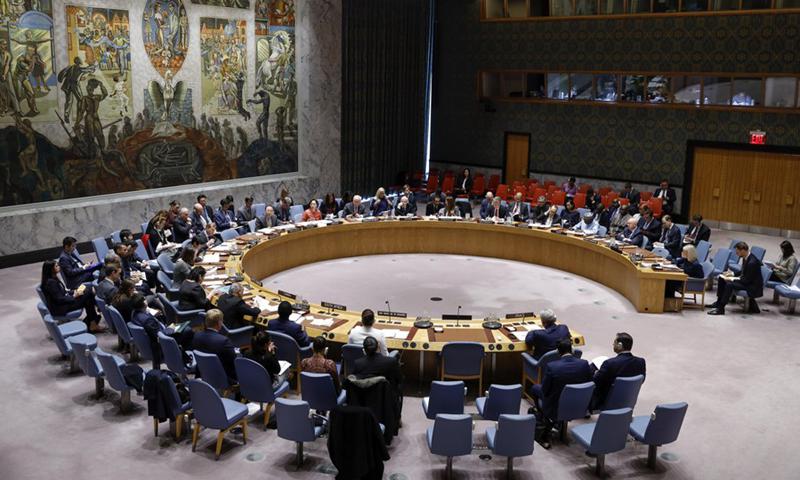Washington's 'small clique' politics exposed as China, Russia battle with US over 'rules', 'multilateralism' at UN

UN Security Council holds a meeting on the Iraq issue at the UN headquarters in New York, the United States, March 3, 2020.(Photo: Xinhua)
Top Chinese and US diplomats clashed again on a China-hosted virtual session of the United Nations (UN) Security Council on Friday. Compared to the China-US Alaska talks, the atmosphere of the multilateralism-themed session was much more mild; however, the division and conflicts were still evident. The session is viewed by analysts as a battle over what "rules" and "multilateralism" mean.
Convened by China and hosted by State Councilor and Foreign Minister Wang Yi, the event is the first since China held the UN Security Council's rotating presidency for the month of May. US Secretary of State Antony Blinken and Russian Foreign Minister Sergei Lavrov were also involved in the "fire from a distance."
At the meeting on Friday, Wang called for unity and cooperation among countries to cope with global challenges, and he also stressed opposing hegemony, unilateralism, ideological conflicts and calling for the responsibility of some "big powers," an unspecified criticism of the US.
Although Blinken stressed "common ground with other countries" and said that cooperation was still the best tool to tackle challenges, his remarks on international rules, human rights and regional hot spots were seen as targeting China.
"Some argue that what governments do within their own borders is their own business and that human rights vary from one society to another, but the 'universal declaration of human rights' begins with the word 'universal' because of our nation agreed there are certain rights which every person everywhere is entitled," Blinken said.
The US is not seeking to uphold the rule-based order to keep other nations down, Blinken said.
Blinken's often-repeated mantra of "playing by the rules" is simply to ask other countries to play by US rules, analysts said. Lavrov's speech was a sharp rebuttal to American hypocrisy.
Lavrov directly slammed the US and its Western allies' hegemonic mentality of sanctions if they refuse to accept their way. West's unlawful unilateral sanctions introduced have no international legal basis, Lavrov said.
Experts reached by Global Times said that despite Blinken's endorsement of the UN system at Friday's session, outside the UN, the US has made small tricks to restrict other countries with allies, such as the very recent G7 targeting "China threats," which has raised questions about Washington's sincerity.
The session also reflects the rock-solid friendship between China and Russia, which, though not strategic allies, will emerge as the strongest defenders of multilateralism under the UN framework for many years, experts said.
One day before the session, Chinese President Xi Jinping held a phone conversation with United Nations Secretary-General Antonio Guterres on Thursday, reiterating the importance of multilateralism, the Xinhua News Agency reported.
The world needs genuine multilateralism, Xi said, adding that all countries should act in accordance with the purposes and principles of the UN Charter, refrain from pursuing unilateralism and hegemony, and should not use multilateralism as a pretext to form small circles or stir up ideological confrontation.
In response to a question on what outcome is expected from the virtual session, Chinese Foreign Ministry spokesperson Wang Wenbin said on Friday at a regular press briefing that clique politics is undermining the authority and effectiveness of multilateral institutions, and ideological confrontation is undermining the fairness and equity of multilateralism.
Lü Xiang, a research fellow at the Chinese Academy of Social Sciences in Beijing, told the Global Times on Friday that insinuating China through the issue of human rights reflects the consistent practice of the US' political warfare. However, Washington's one-sided view of human rights runs counter to the spirit of the UN Charter.
China attaches great importance to people's rights to survival and development and has been very successful in poverty alleviation and dealing with the epidemic, said the expert, noting that the US is not qualified to point fingers at other countries when it's facing an epidemic, race, violence and other problems at home.
In its 240-plus years of existence, the US has been at war for all but 16 years. The US military budget for 2019 exceeded $716 billion, which is equal to the military spending of the next nine countries combined, said the expert, describing US' concerns of regional weaponization and territorial disputes hilarious.
China and Russia, which already share many common interests, will be the strongest proponents of multilateralism under the UN framework over the next decade as they grow closer under US' arrogance and hegemonic mentality, the expert said.
Shi Yinhong, director of Center for American Studies at Renmin University of China, told the Global Times on Friday that unlike the US, China's contribution to world multilateralism is increasing every year.
It is China's consistent position to oppose unilateralism, trade protectionism. China has also actively promoted international political democracy, the experts said, noting these principles will be reflected in the following UN sessions.
Is the US back?
Recent polls have shown that Biden is more popular with US allies than Donald Trump, but the broader picture is of a decline in US leadership around the world due to its clique politics.
In a Morning Consult poll released in late April, favorable view toward the US has risen in Britain, France, Germany, Japan and Australia since January when Biden took office. However, favorable views of the US have declined in China and Russia.
Reported by the Guardian on Wednesday, another poll in Western countries shows that the US is seen as more of a threat to democracy than Russia and China, with 44 percent of respondents in the 53 countries concerned that the US threatens democracy in their country.
"They show neither the US, nor the G7, can simply assume the mantle of defenders of democracy," the Guardian said.
Analysts said that these two polls reflect that the so-called return to multilateralism by the US is only a kind of cliques politics that has not departed from the Cold War mentality. Apart from rallying allies to contain China and Russia, the US has failed to show leadership when it comes to the world's issues—such as the pandemic, economic recovery and regional security—which has disappointed the rest of the world, including much of the West.
Democracy in international relations is fading as the US engages in hegemony and power politics and disregards the existing international order, Zhang Tengjun, an assistant research fellow at the China Institute of International Studies told the Global Times on Friday.
China has provided vaccine assistance to at least 80 developing countries and exported vaccines to more than 50 countries. China has also announced that it will strive to be carbon neutral by 2060, make maximum efforts and contributions to addressing climate change and actively promote international cooperation. Through the Belt and Road Initiative, China provides practical help to developing countries in construction and trade.
Song Luzheng, a research fellow at the China Institute of Fudan University, told the Global Times on Friday that there are fundamental differences between the multilateralism China supports and the small cliques such as G7 and Quad led by the US.
The multilateralism that China supports does not have any country in mind, but the small cliques that the US endorses are targeting China (as a threat), said Song.
He added that China promotes mutually beneficial cooperation and does not attach any political conditions, but the small cliques led by the US are bonded by so-called values; cooperating with the US has only political benefits but not concrete economic gains.
"Countries that cooperate with China can have actual gains, but they have to pay a heavy price when following the US," said Song.
Kishore Mahbubani, Singapore's former ambassador to the UN, said during an event in April that the US has yet to understand that the fundamental competition in East Asia today is not military, but economic. How can the US ask other countries to give up their real interests and sacrifice their relations with China for the US?
It is not in the US' interest to continue the Trump administration's China policy. The Biden administration should wisely terminate it and try to engage in dialogue with China on the basis of mutual respect, he said.
Photos
Related Stories
- Russia to cooperate with China on production of Sputnik V vaccine
- UN General Assembly holds informal dialogue with candidate for next secretary-general
- Chinese FM puts forward four propositions for practicing true multilateralism
- Xi's remarks on upholding multilateralism
- World unable to function well without UN: official
Copyright © 2021 People's Daily Online. All Rights Reserved.










